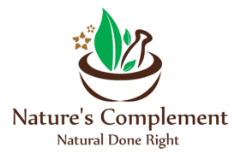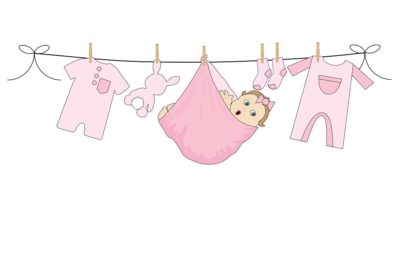
The rabbit hole of cloth diapers all started when I was asked at an event if our laundry soap is safe for cloth diapers. My immediate response was that it’s all natural, so there’s no reason it wouldn’t be safe. However I was corrected in my assumption regarding what was meant by “safe.”
What I thought “safe” meant was for the skin and general health. Human skin is permeable and there are scientific studies to show that many of the ingredients found in everyday products do get into our bloodstream via our skin. For instance, here is a study that shows that surfactants increase absorption through the skin, as does propylene glycol. Unfortunately, with the thousands of chemicals/ingredients that are commonly used in everyday products such as laundry soap, it is not possible to make a generalized statement about skin permeability. Skin permeability is entirely dependent on the specific compound in question, and all these compounds, and combinations of them, are very different from each other.
But there are some commonly used compounds/chemicals that are often found in laundry soaps, and those are usually found in the ingredients list as “perfume” or “fragrance“. Unfortunately, that chemical is usually not just one but a combination of chemicals, and is not at all as it sounds. “perfume” or “fragrance” really should be listed as phthalates. And it’s been discovered over the course of the last decade or two (or longer if one looks deep into the research) that phthalates have consequences. For instance, here is a study about skin permeation and metabolism of di(2-ethylhexyl) phthalate (DEHP), aka “perfume” or “fragrance”. The following study discusses in vitro absorption of some o-phthalate diesters through human and rat skin. Rob wrote an article about the long term health affects of various chemicals, and phthalates being one of the big culprits.
I’m not going to bore you with scientific study after scientific study of evidence that shows our skin is far from bullet proof, my point is that what we put on our body is very important, as it can get into our bodies. We found this interesting study that notes skin irritation perceived to be caused by laundry products was reported by 26% of 3,841 respondents, and perceptions of allergies to laundry products were reported by 21% of the respondents. That’s a high percentage if you ask me, and the study noted that “These problems were experienced more often by females than males and more often by children, age 1 through 20, than other age groups”.
And thus what we wash our clothes with makes a difference and has an affect whether it be on our skin, or through our skin. If there is any residue left over, and with synthetic perfumes there usually are as can be evidenced by your nose (if there is an after scent on the “clean” laundry, there is something still on it), these residual ingredients can get in to us.
But that was an error on my part for presuming that the question was one of human safety. The question of safety was actually in regards to the diapers. Will our laundry soap result in issues with the liners of the cloth diapers, and thus ruin the expensive cloth diaper. Yes, the safety of the diaper liner, not the safety of the baby. My bad, I mean how could I make such an obvious mistake?

First, when it comes to cloth diapers, I want to say congratulations for taking a step toward saving your babies (and your future adult child) from having been exposed to nasty plastics and other chemicals. This includes fragrances found in regular disposable diapers that have documented health effects (for example, phthalates). Of note, there are no ingredients lists found on diapers, so you don’t really know what’s in them, or to what you are exposing your baby to.
Second, I want to say that if you’ve been told that you can’t use real soap, bleach, vinegar, and other related cleaning agents, but instead told that you should only use a certain brand of detergent to wash your cloth diapers in, then you’ve been tricked into buying a certain brand.
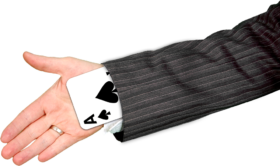
Here at Nature’s Complement, there is one thing we advocate over and over, and that is “show me the data.” That’s right, we’re not going to just take anyone’s word for it, we want to see actual research; we want to look at the data. (When we post articles, we actually cite data or research.) But as we discovered, very few “informational” sites actually do that. They hear something, read something, and post it on their blog, and encourage others to buy a specific brand of detergent, because that one claims its safe despite lack of any actual research or data.
So then an unsuspecting mother/father raising an infant have just been scammed to purchase and use, questionable cleaning detergents that are not only harmful to the skin, (especially a young babies skin), but also contain things like phthalates, aka perfumes (or “fragrance”), and other nasty ingredients whose long term affects are now finally starting to reach public awareness.
How did you get tricked? Very easily. You see, these manufacturers just want your money, that’s all. They figure they need to hold your attention long enough to buy their products until your baby is out of diapers, and hope you return when you have your next baby. In the meantime, most people don’t ask questions.
Well… we ask questions. Lots of them. Not because we plan to use cloth diapers (which we would if we needed diapers), but because we wondered why a person would not even try to use our laundry soap on their cloth diapers. A laundry soap we spent considerable time developing so that consumers could have an all natural laundry soap without harmful ingredients. At first we thought maybe they doubted the cleaning ability, but come to find out, they didn’t want their diapers ruined. Never mind the baby’s skin. Alright, sarcasm aside, we decided to do some serious research into this. And here is what we found in a nutshell.

1. Cloth diapers are a great way to go. Our landfills are overfilling with diapers made of materials that do not degrade when exposed to conditions that would normally break down our garbage. While disposable diapers have taken a lot of the gross factor out of changing a baby (for the most part), there are consequences both environmental, and also biological. Such as having your baby’s young skin exposed to the combinations of chemicals these diapers are made out of. And when you’re changing your baby up to five times a day, those diapers add up quickly.
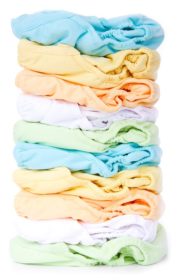
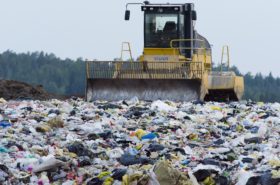
2. Cloth diapers often include (or you buy separately) an insert, which is a liner made of polyester laminate, which is really polyurethane laminate, often referred to as PUL. PUL is really just polyester fabric interlocked with polyurethane. Now, I’ll be the first to admit, when I first heard of “cloth” diapers, I literally thought… well… cloth. But okay, I learned something new. In this day and age, no one wants a leaky diaper, so the liners are added. If taken care of properly they can be re-used. Which serves almost as a true cloth diaper from back in the old days before electricity was discovered. It’s a win win in our day and age. Save the planet, and reduce the amount of chemicals your baby is exposed too. And, save some money to. Anytime you can re-use something, it’s usually a good thing.
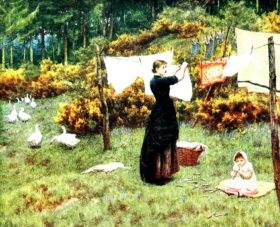
3. Cloth diapers are advertised to only tolerate detergents to avoid soap scum from real soap. So now you have conscientious parents looking for the best way to protect their cloth diaper investment. And for good reason. This is where the research got interesting, because there are so many articles online that state over and over that you can’t use certain ingredients, such as real soap, vinegar, bleach, and other cleaning agents on your cloth diapers. The arguments are interesting, however…
No actual scientific data has been provided as to why you can’t use real soap (or other commonly cited cleaning ingredients) on polyuetherane laminate. Now, there are a ton of articles on the web in regards to this, and many of them make amazing claims. Soap scum buildup, liner degradation, etc. The list is long, and interesting, but I have yet to find an article that actually lists any scientific data to back up the claims that are being made. Zero, zilch, nada.

Each article I found mentions a specific trusted brand you can “safely” use on the diapers. However the ingredients are often questionable for babies’ (and adult) skin – but this is about the diapers remember? I considered listing some of the articles I found, and pointing out the deficiencies in the claims being made. But there are too many, and I don’t want to come off like I’m picking on anyone specifically, since really, I’m questioning all of them. But you can easily do your own web search. And please, if you find real information with real scientific data cited, please please send it to me so I can review the data and update this article accordingly. Our goal at Nature’s Complement is to be transparent and honest, without misinformation and manipulation, so you can make real educated decisions. So if the research is out there, and we just didn’t find it, send it to us for review please.
So here is why I decided to write this article: I’m angry. I’m not trying to sell you laundry soap for cloth diapers, because ours has yet to be tested on such. Instead, I want you to make informed decisions, and you cannot make informed decisions if you are being misled. So here’s the thing, I can’t find any research on cloth diapers and soap versus detergents. So if there’s no research on it, where are those grandiose claims coming from? Personal experience? Great, except that personal experience is not a controlled scientific experiment and there are too many variables (i.e. what type of water you use, how many rinse cycles, did you dry in dryer or line dry, if dryer did you use dryer sheets, how long did the diaper remain soiled before washing, how humid is the environment during line drying the diaper, etc.). So you can’t make conclusive statements about something in that manner. That’s known as anecdotal evidence. That’s bad science, and leads to misinforming the general public. Which then leads to the domino effect of people trying to do right, but based on the misinformation out there, end up making poor choices for their health because some manufacturer wanted to make a buck. I say that because I’m fairly certain that the origin of much of this misinformation comes from manufacturers of detergents themselves. Follow the money.

Since I couldn’t find any studies to show a comparison of durability of diaper liners based on washing with detergent versus soap, I decided to look at the source of the material itself. I managed to find information on how the polyurethane is made, and sure enough:
“Resistance to Cleaners:
High Performance PU’s offer resistance to many commonly used
commercial cleaners and disinfectants as well as alcohol and bleach
solutions. The material will withstand repeated cleaning without
becoming brittle or discoloring. To avoid permanent damage to PU’s or
any other upholstery material, use only cleaning solutions recommended
for soft surfaces and in accordance with the manufacturers
application instructions.”
So there you have it. Overworked, tired, and exhausted new parents, are being taken advantage of by the cloth diaper community by telling them they can’t use healthy and natural sources of laundry soap on their cloth diapers. Nothing in the statement above mentions that detergent is better over real soap, or that real soap shouldn’t be used.
What a shame. Risk harming your baby’s skin, yourself, and harm the planet, and for what? So detergent manufacturers can make a buck?
So what exactly do you actually have to be careful about so that your cloth diapers don’t get ruined? Well, according to the same manufacturer article noted earlier, moisture.
“Hydrolysis resistance is the single most important factor in determining if a
PU is suitable for commercial seating applications. Hydrolysis is the process
by which humidity and heat breaks down the cell structure of a Polyurethane,
resulting in a flaking, brittle surface. Warm weather and humidity can act as
the catalyst for the degradation of the material, but even in an air-conditioned
indoor environment, body heat and sweat can over time be sufficient to break
down a poor quality Polyurethane.”
So the culprits are moisture and heat, not soap. So the baby cloth diapers are designed to be safer for you and the planet, but have the drawback that they will over-time decompose, or at least in time, become brittle. But this is due to moisture and heat, not soap, detergent, bleach, etc.
Since health is our passion, and since one of my really good friends is a single mom that I’ve known for over 20 years, and seen her struggle day in and day out just trying to make ends meet, and having watched her always trying to make good choices for her child, I get very angry when I see misinformation like this. Whether it’s the manufacturers of detergents or unknowing fooled bloggers just copying another blog, it doesn’t matter. The end result is the same. My friend, and many others like her, are tricked yet again into buying a product that could potentially be harmful to her or her baby. And meanwhile, she is being told that using real soap in her laundry detergent will ruin her expensive cloth diapers, when there’s absolutely zero data out there to back up that claim.
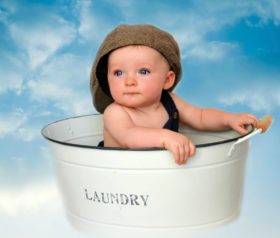
In conclusion:
1. Is our laundry soap concentrate safe for your baby’s skin? Yes, made from the most natural and gentle ingredients we could find.
2. Is our laundry soap “safe” for cloth diapers? Not really, but not because it’s soap, rather because moisture destroys the liner of the cloth diapers, and there’s no way to avoid moisture when washing them. The best thing to do is not allow your cloth diapers to stay soiled (aka wet) for an extended period of time. Instead, wash immediately and line dry as soon as possible to reduce the time that the liner is exposed to moisture. Line drying also reduces the amount of heat exposure that can cause damage. And by the way, by this measure, no detergents are “safe” for cloth diapers either. Detergents obviously involve getting diapers wet also.
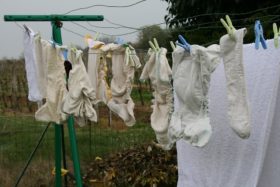
3. Will our laundry soap result in accumulated soap scum because it’s made from real soap? If used according to the instructions and diluted properly, there will be no soap scum left over. The only exception might be if used with real HE (high efficiency) washers. However, I have yet to see that, and if that’s the case, just run an extra rinse cycle, or wash a second time without laundry soap. Any residual soap will come off with an extra (soap free) rinse.
4. Will our laundry soap clean a cloth diaper fully? I don’t know, since no one is willing to try our laundry soap on their cloth diapers because of all the fear tactics used by others. And I’m not able to produce a soiled diaper without a baby, so I have no way to test that. But it works great on every load of regular laundry that we have tried, and the feedback we have received from our testers and customers has been 100% positive thus far.
5. Will I update this article if you send me real scientific data on why you can’t use real soap based laundry soap on your cloth diapers? Yes, but it has to be real data, not some random article found on the internet. Real peer reviewed research with real data.
There is a difference between soap and detergent, and unfortunately, there are also common myths that are floating around on the internet about the two. Some of the information you find online about this topic is actually accurate. But a lot of it is either greatly exaggerated, or is outright fabrication. More importantly, perhaps the single most important difference is almost always overlooked: the effects on human health.
I decided to do some research on baby’s skin versus adult skin, and I was surprised but happy to learn that baby’s skin works as good as a barrier as adult skin, with the exception of premature babies. Premature babies skin has not fully developed and is more permeable and is at greater risk for transdermal exposure to drugs and chemicals. Here is a great research paper discussing how infants skin degree of permeability correlated inversely with gestational age. However, the science has not been settled on this topic yet, and more research would be beneficial.
For Health,
Tober
Nature's Complement is a participant in the Amazon Services LLC Associates Program, an affiliate advertising program. If you purchase products on Amazon through any of our affiliate links, we get a small percentage of the transaction, at no extra cost to you. We spend a lot of time writing the articles on this site, and all this information is provided free of charge. When you use our affiliate links, you support the writing you enjoy without necessarily buying our products. (However we would appreciate if you would do that too!) Thank you for helping to support our work, however you choose to do so.
These statements have not been evaluated by the Food and Drug Administration. This information and/or products are not intended to diagnose, treat, cure or prevent any disease.
